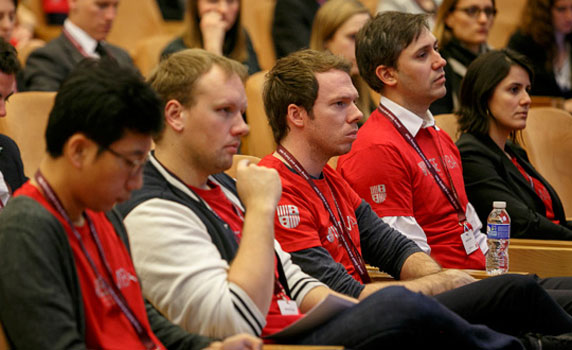
What is responsible business? This was the question asked by the 2015 Doing Good and Doing Well Conference, celebrated on IESE’s Barcelona campus this month. It was also the subject of the keynote address given by Jill Dumain, director of environmental strategy at high-end outdoor clothing manufacturer Patagonia.
Dumain, who has spent her entire career at family-owned Patagonia, shared the inside track on what responsible business means to her and to her company. Patagonia’s mission, she said, could be summarised into three key elements: make the best product possible, cause no unnecessary harm and inspire and implement solutions to environmental problems.
Clothes for Life
Patagonia claims its clothing is guaranteed for life – something Dumain describes as “a de facto way of caring for the environment.”
“Looking into the life cycle of products and making things that last longer is good for the environment. Although some might see it as counter-intuitive – after all, most businesses aim to sell more, not fewer products.”
Patagonia has, in fact, been actively involved in a number campaigns against consumerism; most recently they took part in the ‘Don’t’ Buy This Jacket’ campaign launched in the New York Times on Black Friday, the biggest shopping day in the United States.
“What we’re doing is trying to get people to think of the supply chain behind a product,” Dumain said. “We can make the biggest impact in the countries that make our products.”
It was this sort of thinking that inspired Patagonia’s ‘Common Threads’ initiative in which customers are invited to become part of the effort to reduce the company’s environmental footprint. Customers are asked to buy less, send worn products back to Patagonia for repair, reuse them and above all, to reimagine a sustainable world, says Dumain.
Giving Back and Taking Back
Back in 1994 the company took the decision to only use organically grown cotton. “This was an important step for us,” said Dumain “but not without its challenges: organic cotton represents only one percent of all the cotton grown in the world and it’s more expensive.”
The company also backs a wool project in Patagonia itself, working on the restoration of grasslands in areas where over-grazing is a factor in desertification.
In 2011 the company committed to taking back all of their worn products, and try to repurpose them. While some garments were recycled, others were repaired and sold second-hand as part of the ‘Worn Wear’ program.
More recently, Patagonia has launched an investment arm, ‘$20 Million and Change’, which invests in startups. “The main criteria is that the startups are trying to do something responsible and disruptive,” Dumain said. “For example, there is a project in Chile to make skateboards out of discarded fishing nets.”
Innovative and engaging maybe, but not, she says, without its challenges.
“The main problem with being a responsible company is scaling up. Responsibility is rarely the cheaper option in the short term.”
Working at the Bottom of the Pyramid
The Doing Good and Doing Well Conference also heard from Olivier Kayser of scalable business consultants, Hystra. Kayser talked about working at the “bottom of the pyramid” and said that companies that wish to operate here need to rethink their business model. “You need to look holistically at what your customers need,” Kayser said. “These are people who don’t own property, don’t have access to credit and don’t have bank accounts and savings.”
Before working with people in this situation, he said, you have to ask yourself a question: “are you willing to reinvent your business model, are you ready to learn from others or is your ego too big? Are you prepared to be transformed by collaboration and invest your best people?”
Doing Good and Doing Well Going Strong
Other keynote speeches included IBM’s Angel Pes Guixa on “Smart cities, smart business;” BMW’s Diego Martínez Normand on electric cars; and ExxonMobil’s Todd W. Onderdonk on the “The Outlook for Energy 2015.”
There were also panel discussions and workshops on banking, smart grids and global business ethics, as well as special sessions, including “Supply chain transformations for positive impact,” and “Beyond CSR – how partnerships are creating new models of responsibility.”
Now in its 14th year, Doing Good and Doing Well has covered many aspects of responsible business, impact investing and social entrepreneurship, and remains the largest student-run conference of its kind in Europe.